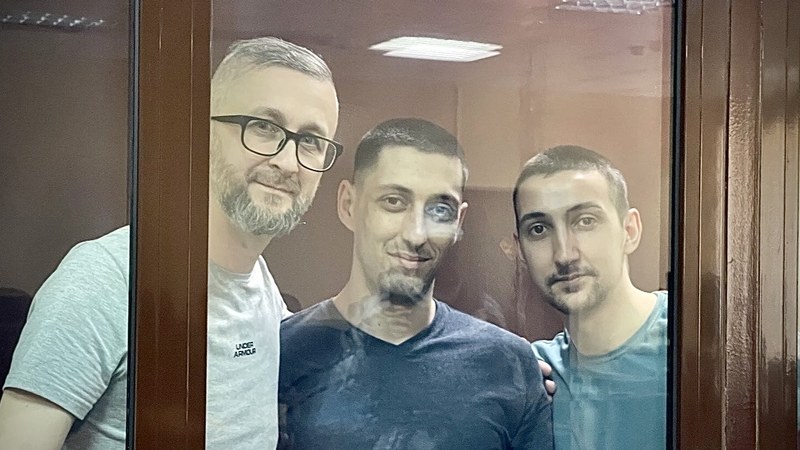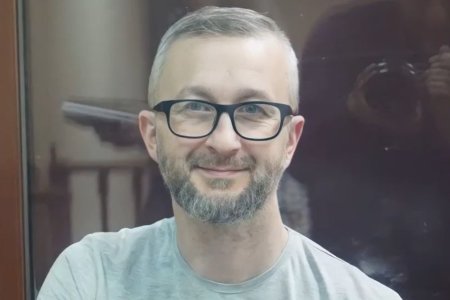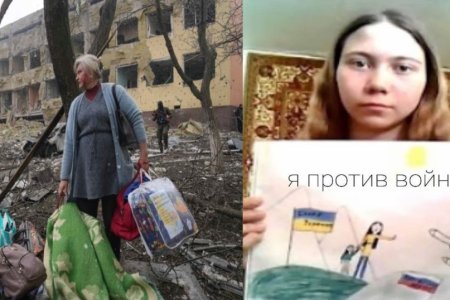
A Russian appeal court has upheld appalling sentences against Nariman Dzhelyal, Crimean Tatar Mejlis leader, and two cousins, Asan and Aziz Akhtemov, while worsening the conditions in which the three recognized political prisoners are to be held. Although the 17, 15 and 13-year sentences were always to be in a harsh-regime prison colony, the Third Court of Appeal in Sochi on 28 July ordered that the men spend the first three years of these sentences in a prison, the very worst of Russia’s penal system. The ‘judges’ – Yelena Urod (presiding); German Aleksandrov and Ilona Stohniy – can have been in no doubt of the fabricated nature of the ‘case’ against the three men. There is not even any certainty that the reported damage to an insignificant gas pipe on 23 August 2021 was an act of ‘sabotage’, and there was absolutely no evidence at all to link any of the three Crimean Tatars to it.
Moscow has orchestrated sentences totalling 45 years and shattered three families in what was, from the outset, recognized as an act of revenge against Nariman Dzhelyal, for his part in the international Crimea Platform inaugural meeting in Kyiv. It was also the latest stage in Russia’s ongoing offensive against the Mejlis which has consistently opposed Russia’s invasion and occupation of Crimea and demonstrated that the vast majority of Crimean Tatars identify with Ukraine. It was always politically awkward that the Crimean Tatars, the largest indigenous people of Ukraine, and their representative assembly, were so evidently against Russia’s annexation, and have paid a huge price as the main targets of Russian repression. On 19 April 2017, the UN’s International Court of Justice ordered Russia to withdraw its ban on the Mejlis. Instead of doing so, Russia’s FSB have already fabricated at least two prosecutions aimed solely at trying to discredit the Mejlis, and the trial of Dzhelyal, the highest-ranking member of the Mejlis still living in occupied Crimea, following earlier persecution, was clearly the next stage. Dzhelyal himself pointed to the likely motives during his final address to the occupation ‘Crimean high court’ in August 2022. He had long understood the danger he faced and said that one of the FSB [Russian security service] officers who took him prisoner on 4 September 2021 had spelled out the link with the Crimea Platform. “The criminal charges against me, an activist of the Crimean Tatar national movement, a delegate of the Qurultay [National Congress] and First Deputy Head of the Mejlis of the Crimean Tatar people, are aimed at outlawing and labelling as ‘terrorist’ the entire system of representative bodies of the Crimean Tatars. And, in this way, opening the way to mass repression against the indigenous people of Crimea. This is not simply an obvious and logical conclusion. I was told about such an intention, whether deliberately or inadvertently, within the FSB building. “
Dzhelyal is also a journalist and human rights defender who made an important contribution to the Crimea Platform meeting attended by high-ranking representatives of 45 countries. Moscow had reacted with aggression to the Crimea Platform, whose ultimate aim is the liberation of Crimea from Russian occupation, had openly threatened Dzhelyal with reprisals if he attended. Although this is precisely what happened, a mere two weeks after the meeting on 23 August 2021, Dzhelyal pointed out during his final address that had he not been arrested then, he would have been soon enough, as he had made no secret of his opposition to Russia’s full-scale invasion of Ukraine.
Abductions rather than arrests
Nariman Dzhelyal (b. 1980) was the last of five Crimean Tatars to be essentially abducted from their homes after armed raids on 3 and 4 September 2021. Civic journalist Asan Akhtemov (b. 1989) and his cousin, Aziz Akhtemov (b. 1996) were seized during the night from 3-4 September. Both were held incommunicado and prevented from seeing independent lawyers until the European Court of Human Rights [ECHR] intervened almost ten days later. The two men immediately retracted their ‘confessions’ and gave shocking accounts of the torture used to obtain this. As well as electric shocks and other physical torture, the FSB had also threatened reprisals against the men’s families.
Both Eldar Odamanov, who had disappeared after the armed search of his home earlier on 3 September, and Shevket Useinov, seized during the following night, were held incommunicado until 5 September. They were then jailed for 10 and 15 days on absurd charges, quite unrelated to the armed raids on their homes. As feared, the two latter men had been forced into ‘testifying’ against Dzhelyal and the Akhtemovs. During the men’s trial, however, both men described the illegal methods of duress that the FSB had used to obtain such ‘testimony’.
Fictitious ‘sabotage’
There is no real evidence that an act of sabotage was committed on 23 August 2021, while Dzhelyal was in Kyiv. There appears to have been some minor damage to a gas pipe in Perevalne, with the initial criminal investigation launched being under Article 167 § 2 of Russia’s criminal code (‘deliberate destruction or damage to property’. There was no further mention of this damage, and to this day no photos, etc. have been made public. The gas pipe in question was not on any central circuit and could be fixed relatively easily, and painlessly, given that any disruption to gas supplies was in summer.
Despite all of the above, the FSB first seized five Crimean Tatars and then came up with the claim that there had been an act of ‘sabotage’ which had been planned by Ukraine’s Military Intelligence together with the Mejlis.
No evidence
The indictment was based solely upon ‘testimony’ obtained while men were held incommunicado and without access to proper lawyers. Asan and Aziz Akhtemov both retracted their supposed ‘testimony’ as soon as they were able to speak with lawyers. The first of many increases to the charges came immediately after the Akhtemovs ignored an open threat from the FSB and retracted the ‘confessions’ obtained through torture. As well as confirmation in court from both Odamanov and Useinov, that they had been placed under duress, there had also previously been public statements from two Crimean Tatars who found the courage to refuse to collaborate with the FSB and provide false testimony.
The men were all accused of carrying out an act of sabotage as part of an organized group (Article 281 § 2a), and of the illegal purchase, transfer or possession of explosives as part of an organized group (Article 222.1 § 4). On 8 November, an additional charge was added, of smuggling an explosive device, as part of an organized group (Article 226.1 § 1); and of ‘causing considerable material damage to the Crimean gas network (to the tune of around 1,425 USD). It was even claimed that the minor damage to an obscure gas pipe constituted “an attack on the Russian Federation’s defence capabilities”.
There were also three ‘secret witnesses’, whose ‘testimony’ could not be verified. As in all such cases, no grounds were provided to justify anonymity, yet the ‘court’ not only allowed it, but also obstructed the defence from demonstrating the flaws in the supposed testimony (details here).
Sentences to order
On 21 September 2022, ‘judges’ Viktor Ivanovich Zinkov; Aleksei Viktorovich Kozyrev and Sergei Nikolaevich Pogregniak from the Russian occupation ‘Crimean high court’ sentenced Nariman Dzhelyal to 17 years’ imprisonment; Asan Akhtemov – to 15 years; and Aziz Akhtemov to 13 years, with all in harsh-regime prison colonies. Steep fines were also imposed: 700 thousand roubles (around 9 thousand euros) in Nariman’s case, 500 thousand roubles against Asan and Aziz Akhtemov. The sentence against Dzhelyal was two years longer than that demanded by ‘prosecutor’ Roman Lobov.
All of these individuals, and the three court of appeal ‘judges’ - Yelena Urod (presiding); German Aleksandrov and Ilona Stohniy – who took just a day and a half to increase those sentences, were well aware that this was a political trial. It was impossible not to notice that the indictment did not bear scrutiny and that there was no evidence except that either retracted by men who had given ‘confessions’ while held incommunicado, or by ‘secret witnesses’. Russia’s use of such anonymous ‘witnesses’, who may not even know the defendants, has been criticized by the United Nations High Commissioner for Human Rights and Secretary-General and found in violation of the right to a fair trial by the European Court of Human Rights.
Please help to provide publicity about this horrific travesty of justice. This was a political trial and it is vital now that western governments put pressure on Moscow to at least agree to free Nariman Dzhelyal; Asan and Aziz Akhtemov in an exchange of prisoners. All three men are married with small children (Nariman has four, Asan – two and Aziz a small daughter) who will otherwise grow up not knowing their fathers. You can also help by asking your government representatives to help ensure accountability, at least in the form of international bans and other sanctions, against those ‘judges’ ‘prosecutors’ and others involved in carrying out Moscow’s politically motivated act of vengeance.



